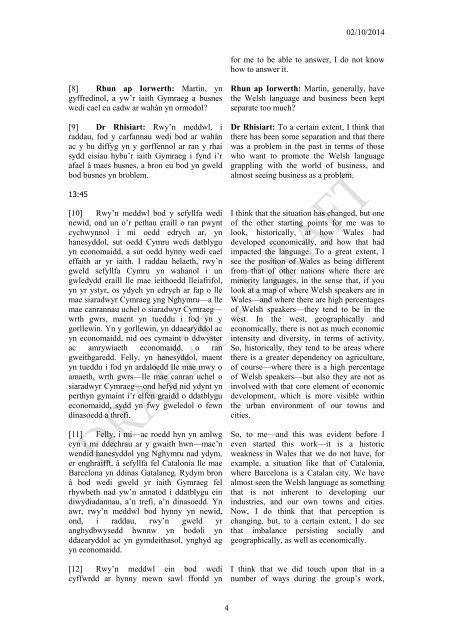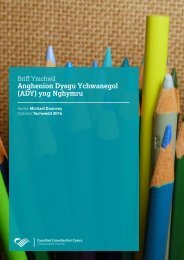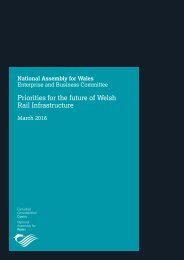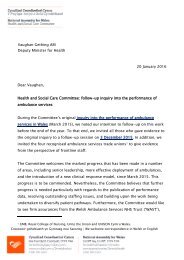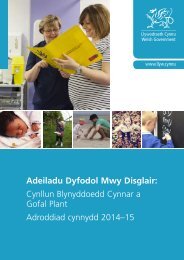You also want an ePaper? Increase the reach of your titles
YUMPU automatically turns print PDFs into web optimized ePapers that Google loves.
02/10/<strong>2014</strong><br />
for me to be able to answer, I do not know<br />
how to answer it.<br />
[8] Rhun ap Iorwerth: Martin, yn<br />
gyffredinol, a yw’r iaith Gymraeg a busnes<br />
wedi cael eu cadw ar wahân yn ormodol?<br />
[9] Dr Rhisiart: Rwy’n meddwl, i<br />
raddau, fod y carfannau wedi bod ar wahân<br />
ac y bu diffyg yn y gorffennol ar ran y rhai<br />
sydd eisiau hybu’r iaith Gymraeg i fynd i’r<br />
afael â maes busnes, a bron eu bod yn gweld<br />
bod busnes yn broblem.<br />
Rhun ap Iorwerth: Martin, generally, have<br />
the Welsh language and business been kept<br />
separate too much?<br />
Dr Rhisiart: To a certain extent, I think that<br />
there has been some separation and that there<br />
was a problem in the past in terms of those<br />
who want to promote the Welsh language<br />
grappling with the world of business, and<br />
almost seeing business as a problem.<br />
13:45<br />
[10] Rwy’n meddwl bod y sefyllfa wedi<br />
newid, ond un o’r pethau eraill o ran pwynt<br />
cychwynnol i mi oedd edrych ar, yn<br />
hanesyddol, sut oedd Cymru wedi datblygu<br />
yn economaidd, a sut oedd hynny wedi cael<br />
effaith ar yr iaith. I raddau helaeth, rwy’n<br />
gweld sefyllfa Cymru yn wahanol i un<br />
gwledydd eraill lle mae ieithoedd lleiafrifol,<br />
yn yr ystyr, os ydych yn edrych ar fap o lle<br />
mae siaradwyr Cymraeg yng Nghymru—a lle<br />
mae canrannau uchel o siaradwyr Cymraeg—<br />
wrth gwrs, maent yn tueddu i fod yn y<br />
gorllewin. Yn y gorllewin, yn ddaearyddol ac<br />
yn economaidd, nid oes cymaint o ddwyster<br />
ac amrywiaeth economaidd, o ran<br />
gweithgaredd. Felly, yn hanesyddol, maent<br />
yn tueddu i fod yn ardaloedd lle mae mwy o<br />
amaeth, wrth gwrs—lle mae canran uchel o<br />
siaradwyr Cymraeg—ond hefyd nid ydynt yn<br />
perthyn gymaint i’r elfen graidd o ddatblygu<br />
economaidd, sydd yn fwy gweledol o fewn<br />
dinasoedd a threfi.<br />
[11] Felly, i mi—ac roedd hyn yn amlwg<br />
cyn i mi ddechrau ar y gwaith hwn—mae’n<br />
wendid hanesyddol yng Nghymru nad ydym,<br />
er enghraifft, â sefyllfa fel Catalonia lle mae<br />
Barcelona yn ddinas Gatalaneg. Rydym bron<br />
â bod wedi gweld yr iaith Gymraeg fel<br />
rhywbeth nad yw’n annatod i ddatblygu ein<br />
diwydiadannau, a’n trefi, a’n dinasoedd. Yn<br />
awr, rwy’n meddwl bod hynny yn newid,<br />
ond, i raddau, rwy’n gweld yr<br />
anghydbwysedd hwnnw yn bodoli yn<br />
ddaearyddol ac yn gymdeithasol, ynghyd ag<br />
yn economaidd.<br />
[12] Rwy’n meddwl ein bod wedi<br />
cyffwrdd ar hynny mewn sawl ffordd yn<br />
I think that the situation has changed, but one<br />
of the other starting points for me was to<br />
look, historically, at how Wales had<br />
developed economically, and how that had<br />
impacted the language. To a great extent, I<br />
see the position of Wales as being different<br />
from that of other nations where there are<br />
minority languages, in the sense that, if you<br />
look at a map of where Welsh speakers are in<br />
Wales—and where there are high percentages<br />
of Welsh speakers—they tend to be in the<br />
west. In the west, geographically and<br />
economically, there is not as much economic<br />
intensity and diversity, in terms of activity.<br />
So, historically, they tend to be areas where<br />
there is a greater dependency on agriculture,<br />
of course—where there is a high percentage<br />
of Welsh speakers—but also they are not as<br />
involved with that core element of economic<br />
development, which is more visible within<br />
the urban environment of our towns and<br />
cities.<br />
So, to me—and this was evident before I<br />
even started this work—it is a historic<br />
weakness in Wales that we do not have, for<br />
example, a situation like that of Catalonia,<br />
where Barcelona is a Catalan city. We have<br />
almost seen the Welsh language as something<br />
that is not inherent to developing our<br />
industries, and our own towns and cities.<br />
Now, I do think that that perception is<br />
changing, but, to a certain extent, I do see<br />
that imbalance persisting socially and<br />
geographically, as well as economically.<br />
I think that we did touch upon that in a<br />
number of ways during the group’s work,<br />
4


